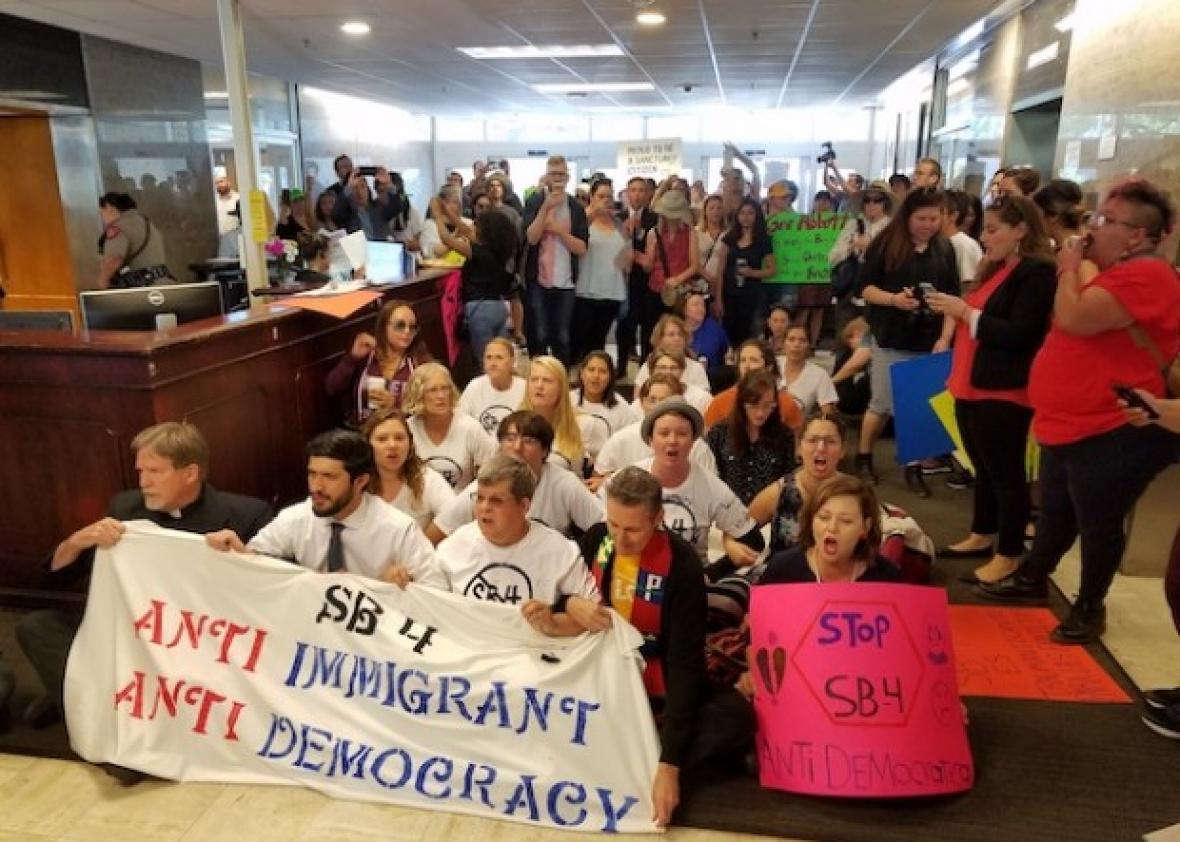Nearly four months after Texas’ Greg Abbott declared the abolition of sanctuary cities a top legislative priority, the governor has a sweeping new law on his desk that will force the state’s largest sanctuary jurisdiction, Travis County, to hold without a warrant individuals that the U.S. Department of Homeland Security suspects of violating immigration law.
In January, Abbott cut $1.5 million in criminal justice grants from the county—which includes Austin—to urge its sheriff, Sally Hernandez, to fall in line. (Those grants were not related to immigration, but instead funded programs in drug-diversion, family-violence therapy, and juvenile justice.) Judge Sarah Eckhardt, the chief executive of Travis County, insisted the sheriff was following the law, under which detainer requests are not mandatory.
Texas’ new SB 4 will change that. The law, which passed the state House of Representatives last week and Senate this week, imposes statewide standards on local police departments, with fines, charges, and jail time for officers and officials who don’t comply. It will also give new freedom to individual police officers who want to pursue violations of immigration law on the job.
It’s a victory for Abbott that will be cited as an example by Republicans in Washington and state capitals. It’s also a preview of how the central paradox of the sanctuary debate—the bills are advanced as law-and-order initiatives but are almost uniformly opposed by big-city police chiefs—will play out in Washington if Congress decides to take up the issue.
At the same time, SB 4 is only nominally about detainer requests.
The two most consequential components of the law have little to do with what happens in jails. The first is a section that prohibits cities, counties, and universities from ordering officers not to inquire “into the immigration status of a person under a lawful detention or under arrest.”
Civil liberties advocates and immigrant groups say this pre-emption of municipal authority essentially gives carte blanche to officers to harass immigrants and dark-skinned Americans. Terri Burke, the director of the ACLU in Texas, called it a “wrongheaded, racist piece of legislation.”
The law authorizing police to address immigration status during lawful detentions, which include traffic stops, recalls Arizona’s SB 1070, they say. That statute, known as the “show me your papers” law, generated boycotts of Arizona and was eventually partially overturned by the Supreme Court.
In its text, the new Texas law falls well short of Arizona’s 2010 law. SB 1070 required officers conducting a stop to “make a reasonable attempt” to verify immigration status and gave them the authority to transfer individuals suspected of violating immigration law to federal custody. Those sections were moderated in a September settlement between the state of Arizona and immigrant groups.
Still, Texas’ evident desire for local police to do immigration enforcement on the beat will send a message, the state’s police chiefs say. SB 4 will invalidate laws like Houston’s, which prevent street patrol cops from asking about immigration status. Dozens of cities have similar guidelines. And while SB 4 contains explicit exceptions for witnesses and victims of crimes, the line between witness and suspect can be blurry when police arrive at a crime scene. (Both parties are sometimes arrested in domestic violence calls, for example.)
Which brings us to the second important complaint about SB 4: that it will reduce trust between immigrant communities and law enforcement. (That’s to say nothing of its effect on daily life for undocumented immigrants.)
This, as much as detainer policy specifically, is what brought the police chiefs of the state’s largest jurisdictions to testify against the law. On April 18, sheriffs from Travis, Dallas, Harris (Houston), Bexar (San Antonio), and El Paso counties published a newspaper editorial arguing against the bill.
On April 28, the police chiefs of Dallas and Houston followed suit with an op-ed co-signed by chiefs from Austin, Arlington, Fort Worth, and San Antonio, as well as James McLaughlin, the director of the Texas Police Chiefs Association. “Officers would start inquiring about the immigration status of every person they come in contact with, or worse, inquire about the immigration status of people based on their appearance,” they wrote. “This will lead to distrust of police and less cooperation from members of the community. And it will foster the belief that people cannot seek assistance from police for fear of being subjected to an immigration status investigation.”
This is already happening, as a result, immigrants rights groups say, of the newly empowered Immigration and Customs Enforcement police. In March, Los Angeles police chief Charlie Beck said reports of sexual assault made by Latino residents have dropped 25 percent over last year. Reports of domestic violence from Latino communities are down 10 percent. Fears of deportation have also frightened witnesses from testifying in criminal prosecutions.
Now, Texas law enforcement is worried about that effect getting worse in the state’s big cities, where fear is already impacting policing. In March, Houston police chief Art Acevedo released statistics showing that reports of rapes from Hispanics have dropped 43 percent compared with the same time last year, compared with an 8.2 percent increase in non-Hispanic victims reporting rapes.
“The perception we’re going to create by having this legislation is going to have a tremendously chilling effect on the immigrant community,” Acevedo said in a press conference last week.
Despite a broad consensus that sanctuary cities are safer than their peers, and that immigrants commit fewer crimes than native-born Americans, Republicans have continued to frame SB 4 as a law-and-order policy.
“There are some officials in the state of Texas, as well as across the United States, who simply do not want to apply the rule of law in their jurisdiction, who want to promote lawlessness,” Abbott told Fox News on Sunday. “And it’s inexcusable.”
Is he talking about the state’s police chiefs?
